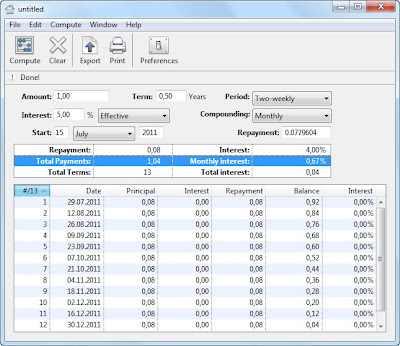Javascript Program For Calculating Simple Interest: Full Version Free Software Download
Here is full code example of Java program to calculate Simple Interest in. U make a program for simple interest with a. 5 Free JavaScript Books to download. A JavaScript display engine for mathematics that works in all browsers. No more setup for readers. Highly modular on input and output. Use MathML, TeX and ASCIImath as input and produce HTML+CSS, SVG and MathML as output. You can also copy equations into Office, LaTeX, wikis, and other software. Compound Interest Codes and Scripts Downloads Free. This software is used to keep encrypted records of '. Script for calculating simple interest.
CoffeeScript Logo CoffeeScript is a little language that compiles into JavaScript. 1000 Palabras Basicas En Ingles Pdf Files. Underneath that awkward Java-esque patina, JavaScript has always had a gorgeous heart. CoffeeScript is an attempt to expose the good parts of JavaScript in a simple way.
The golden rule of CoffeeScript is: “It’s just JavaScript.” The code compiles one-to-one into the equivalent JS, and there is no interpretation at runtime. You can use any existing JavaScript library seamlessly from CoffeeScript (and vice-versa). The compiled output is readable, pretty-printed, and tends to run as fast or faster than the equivalent handwritten JavaScript. Latest Version: # Install locally for a project: npm install --save-dev coffeescript # Install globally to execute.coffee files anywhere: npm install --global coffeescript Overview CoffeeScript on the top left, compiled JavaScript output on the bottom right. The CoffeeScript is editable! # Assignment: number = 42 opposite = true # Conditions: number = -42 if opposite # Functions: square = (x) ->x * x # Arrays: list = [1, 2, 3, 4, 5] # Objects: math = root: Math.sqrt square: square cube: (x) ->x * square x # Splats: race = (winner, runners.) ->print winner, runners # Existence: alert 'I knew it!'


# Array comprehensions: cubes = (math.cube num for num in list) # Assignment: number = 42 opposite = true # Conditions: number = -42 if opposite # Functions: square = ( x ) ->Prs Guitars Serial Number Search here. x * x # Arrays: list = [ 1, 2, 3, 4, 5 ] # Objects: math = root: Math. Sqrt square: square cube: ( x ) ->x * square x # Splats: race = ( winner, runners.) ->print winner, runners # Existence: alert 'I knew it!' # Array comprehensions: cubes = ( math. Cube num for num in list ). Var mobyDick; mobyDick = 'Call me Ishmael. Some years ago -- never mind how long precisely -- having little or no money in my purse, and nothing particular to interest me on shore, I thought I would sail about a little and see the watery part of the world.'
; var mobyDick; mobyDick = 'Call me Ishmael. Some years ago -- never mind how long precisely -- having little or no money in my purse, and nothing particular to interest me on shore, I thought I would sail about a little and see the watery part of the world.' JSON.stringify(currentUser) In ECMAScript this is called, and has been supported for arrays since ES2015 but is. Until object spread syntax is officially supported, the CoffeeScript compiler outputs the same polyfill as; but once it is supported, we will revise the compiler’s output.
Note that there are between the polyfill and the current proposal. Loops and Comprehensions Most of the loops you’ll write in CoffeeScript will be comprehensions over arrays, objects, and ranges. Comprehensions replace (and compile into) for loops, with optional guard clauses and the value of the current array index. Unlike for loops, array comprehensions are expressions, and can be returned and assigned. Countdown Note how because we are assigning the value of the comprehensions to a variable in the example above, CoffeeScript is collecting the result of each iteration into an array. Sometimes functions end with loops that are intended to run only for their side-effects. Be careful that you’re not accidentally returning the results of the comprehension in these cases, by adding a meaningful return value — like true — or null, to the bottom of your function.
To step through a range comprehension in fixed-size chunks, use by, for example: evens = (x for x in [0.10] by 2) If you don’t need the current iteration value you may omit it: browser.closeCurrentTab() for [0.count] Comprehensions can also be used to iterate over the keys and values in an object. Use of to signal comprehension over the properties of an object instead of the values in an array. Ages.join(', ') If you would like to iterate over just the keys that are defined on the object itself, by adding a hasOwnProperty check to avoid properties that may be inherited from the prototype, use for own key, value of object.
To iterate a generator function, use from. The only low-level loop that CoffeeScript provides is the while loop. The main difference from JavaScript is that the while loop can be used as an expression, returning an array containing the result of each iteration through the loop. There are a handful of statements in JavaScript that can’t be meaningfully converted into expressions, namely break, continue, and return.